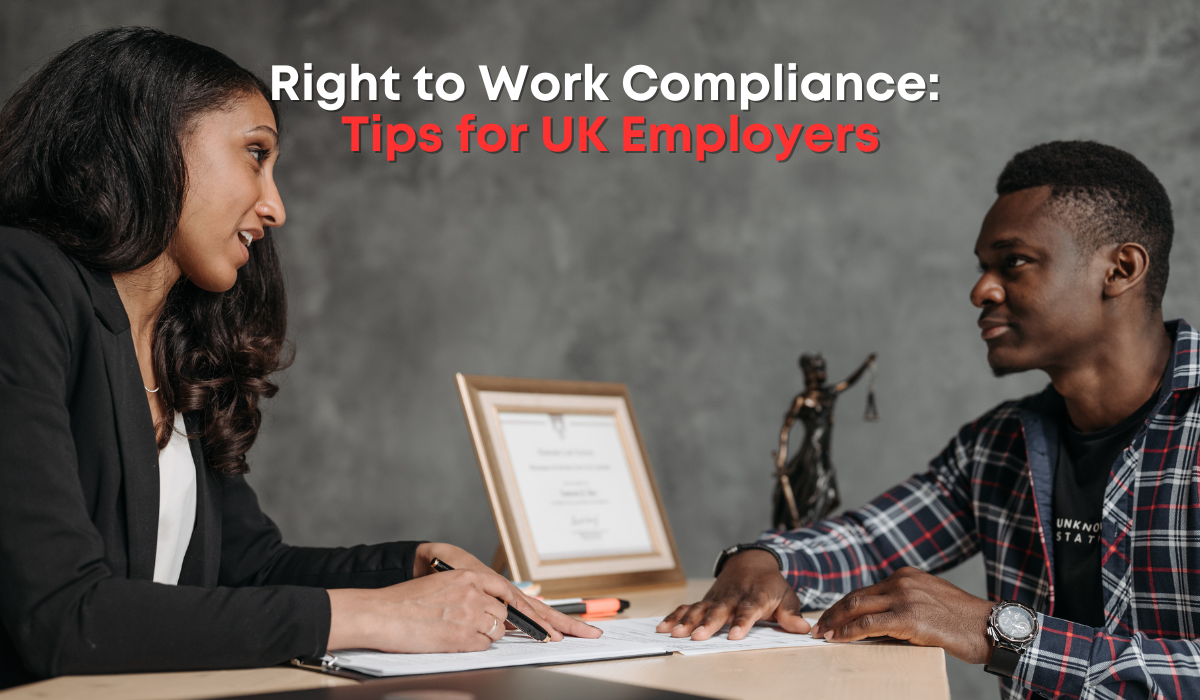The UK’s Right to Work framework is a cornerstone of the nation’s immigration and employment system, balancing economic stability, social cohesion, and the fight against illegal working. However, the complexities of verifying and maintaining compliance with these rules can often leave employers and workers navigating a labyrinth of legal and procedural requirements.
This article unpacks the intricate details of the UK’s Right to Work regulations, offering a comprehensive guide for employers striving to comply with their obligations and for workers aiming to secure lawful employment.
What is the Right to Work?
The “Right to Work” is a legal term denoting an individual’s permission to undertake employment in the UK. This right, defined by immigration status or citizenship, ensures that only those legally entitled to work can access employment opportunities, safeguarding the labour market from exploitation and illegal practices.
Enshrined in the Immigration, Asylum and Nationality Act 2006, this framework places dual obligations on workers and employers. Workers must present valid evidence of their Right to Work, while employers must verify this documentation to avoid employing individuals without the proper permissions.
Failure to adhere to these requirements can result in significant penalties. Employers face fines of up to £45,000 per illegal worker for a first breach, escalating to £60,000 for subsequent violations. Criminal charges and reputational damage further underscore the need for compliance.
Workers’ Responsibilities
Workers in the UK, regardless of nationality, bear the onus of ensuring that their documentation remains valid and up to date. They must promptly inform their employer of any changes to their immigration status, particularly if such changes affect their ability to work legally.
Employers’ Obligations
Employers, on the other hand, must:
- Verify an employee’s Right to Work before employment begins.
- Retain evidence of these checks throughout the employee’s tenure and for two years after their departure.
- Conduct follow-up checks for employees with time-limited work permissions.
The Home Office provides detailed guidance and tools to assist with these checks. However, staying abreast of evolving rules, such as the move to eVisas in January 2025, is critical.
Who Has the Right to Work in the UK?
The Right to Work is determined by an individual’s citizenship, immigration status, or visa conditions. Key groups include:
- UK Citizens
British nationals have an unrestricted Right to Work in the UK. - Irish Citizens
Due to the Common Travel Area agreement, Irish citizens share this unrestricted right. - EU Citizens with Settled or Pre-Settled Status
EU, EEA, and Swiss citizens who obtained settled or pre-settled status under the EU Settlement Scheme retain their work rights post-Brexit. As of July 2024, employers no longer need to conduct follow-up checks for individuals with pre-settled status. - Visa Holders with Work Authorisation
This includes holders of Skilled Worker visas, Global Talent visas, and other work visas. - Individuals with Limited Leave to Remain
Certain visa categories, such as family or student visas, permit limited work rights.
Types of Right to Work Checks
The Home Office prescribes several methods for employers to verify Right to Work status. Each method corresponds to specific worker categories and circumstances:
- Digital Identity Checks via IDSPs
Employers can use certified Identity Service Providers (IDSPs) to verify the identity of British or Irish citizens with a valid passport or passport card. This process involves capturing biometric data and retaining records. - Online Checks Using Share Codes
Non-British/Irish nationals with digital immigration status (e.g., eVisa holders or those with biometric residence permits) can generate a share code for employers to verify their Right to Work online. - Manual Checks
Workers provide physical documents, such as passports or biometric residence permits. Employers must inspect these in person and retain copies. - Employer Checking Service (ECS)
When a worker has a pending Home Office application, employers must request a Positive Verification Notice (PVN) from the ECS before employment begins.
Challenges in Right to Work Compliance
- Complex and Evolving Rules
Frequent changes to immigration regulations—such as the phasing out of biometric residence permits by December 2024—can catch employers off guard. Regular training and updates are essential to maintaining compliance.
- Document Issues
Lost or expired documents can hinder workers’ ability to prove their Right to Work. Employers can mitigate this by leveraging the Employer Checking Service or offering conditional employment contracts.
- Discrimination Risks
Employers must apply checks uniformly to avoid breaching the Equality Act 2010. Selective checks based on nationality or ethnicity can lead to costly discrimination claims.
- Data Privacy
Handling sensitive immigration documents requires strict adherence to GDPR standards. Employers must ensure secure storage and limit access to authorised personnel.
Mitigating Allegations of Non-Compliance
Non-compliance with Right to Work regulations can trigger Home Office enforcement action. Employers facing allegations should:
- Conduct an Internal Audit
Review employment records to identify gaps or inconsistencies. - Cooperate with the Home Office
Provide requested documentation promptly to demonstrate good faith. - Seek Legal Counsel
Immigration specialists can offer guidance and represent employers in negotiations or appeals. - Implement Corrective Measures
Update policies, retrain staff, and establish regular audits to prevent future breaches.
Looking Ahead
The UK’s Right to Work framework is a testament to the delicate balance between upholding legal employment practices and fostering an inclusive labour market. For workers, it offers a pathway to lawful employment. For employers, it underscores the importance of vigilance, equity, and compliance.
As we approach significant shifts—such as the widespread adoption of eVisas—employers and workers alike must stay informed and adaptable. By fostering a proactive compliance culture, businesses can not only avoid penalties but also contribute to a fairer and more transparent labour market.
For more information or assistance with your Right to Work obligations, consult our immigration compliance experts today.
Get in touch: For a comprehensive understanding of your options or queries on UK immigration matters, contact GigaLegal Solicitors at 02074067654 or click here to book a no-obligation consultation with an immigration expert.


